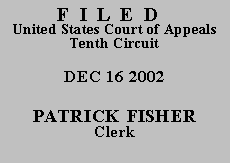

|
EDDIE TAFOYA,
v.
JOE WILLIAMS, Warden, Lea County
Correctional Facility; ATTORNEY
GENERAL FOR THE STATE OF
NEW MEXICO |
|
Before KELLY, McKAY, and MURPHY, Circuit Judges.
This case is before the court on a request by Eddie Tafoya for a certificate of appealability ("COA"). Tafoya seeks a COA so he can appeal the district court's dismissal of his 28 U.S.C. § 2254 petition. See 28 U.S.C. § 2253(c)(1)(A) (providing that no appeal may be taken from the denial of a § 2254 petition unless the petitioner first obtains a COA). On July 9, 1997, Tafoya pleaded guilty to second degree murder, attempt to commit first degree murder, two counts of negligently-caused child abuse resulting in no great bodily harm, and aggravated assault with a deadly weapon. He was sentenced to a 498-month term of imprisonment. Tafoya filed various post-conviction motions in New Mexico state court, all of which were denied. Tafoya then filed a federal habeas corpus petition pursuant to 28 U.S.C. § 2254. In his § 2254 petition, Tafoya raised several ineffective assistance of counsel claims.
Respondent filed a Motion to Dismiss, asserting that Tafoya's § 2254 petition was untimely under the Antiterrorism and Effective Death Penalty Act of 1996. See 28 U.S.C. § 2244(d)(1) ("A 1-year period of limitation shall apply to an application for a writ of habeas corpus by a person in custody pursuant to a judgment of a State court."). After Tafoya responded to the Motion to Dismiss, the magistrate judge prepared a report recommending that Tafoya's § 2254 petition be dismissed as untimely. The district court adopted the magistrate's recommendation and dismissed the petition with prejudice.
In his appellate brief, Tafoya does not argue that the district court miscalculated the one-year limitation period. Instead, he argues that the one-year period should be equitably tolled because he is actually innocent of one of the charges to which he pleaded guilty. See Gibson v. Klinger, 232 F.3d 799, 808 (10th Cir. 2000) ("Equitable tolling would be appropriate, for example, when a prisoner is actually innocent . . . ."). Tafoya contends that the crime of attempt to commit first degree murder does not exist under New Mexico law and, thus, he is actually innocent of that crime. Even assuming that Tafoya's assertions relate to actual innocence as opposed to factual innocence, his argument fails. The New Mexico Court of Appeals has held that the crime of attempted first degree felony murder does not exist under New Mexico law. See State v. Price, 726 P.2d 857, 858-60 (N.M. Ct. App.1986). That court has also held that the crimes of attempted depraved mind murder and attempted unintentional second degree murder likewise do not exist. See State v. Johnson, 707 P.2d 1174, 1179, 1180 (N.M. Ct. App. 1985). Tafoya, however, was indicted and convicted of "attempt to commit a felony, to wit: first degree murder willful and deliberate." Consequently, neither of these New Mexico cases provides support for Tafoya's argument.
This court has reviewed Tafoya's application for a COA, his appellate brief, and the entire record on appeal. That de novo review clearly demonstrates the district court's dismissal of Tafoya's § 2254 petition as untimely is not deserving of further proceedings or subject to a different resolution on appeal. Accordingly, this court denies Tafoya's request for a COA for substantially those reasons set forth in the magistrate judge's report and recommendation dated April 8, 2002 and the district court's order dated May 6, 2002 and dismisses this appeal.
ENTERED FOR THE COURT
Michael R. Murphy
Circuit Judge
*. This order and judgment is not binding precedent, except under the doctrines of law of the case, res judicata and collateral estoppel. The court generally disfavors the citation of orders and judgments; nevertheless, an order and judgment may be cited under the terms and conditions of 10th Cir. R. 36.3.